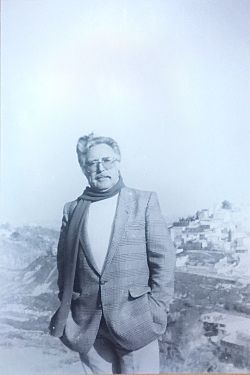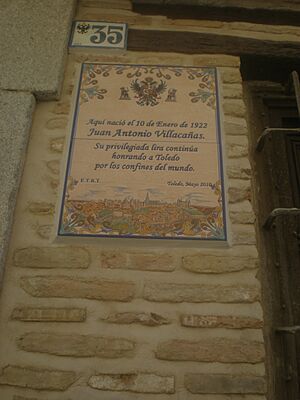Juan Antonio Villacañas facts for kids
Quick facts for kids
Juan Antonio Villacañas
|
|
|---|---|
 |
|
| Born | 1922 Toledo, |
| Died | 2001 Toledo, |
| Occupation | Poet, literary critic |
| Nationality | Spanish |
| Genre | Poetry |
Juan Antonio Villacañas (born in 1922 in Toledo; died on August 21, 2001) was a Spanish poet, essayist, and critic. In 2015, his hometown, Toledo, named him a "distinguished son." This is a special honor given to important people from a city.
Contents
About Juan Antonio Villacañas
Juan Antonio Villacañas was born in Toledo in 1922. The Spanish Civil War stopped his high school education. He did his military service in different places, like Melilla and the Pyrenees mountains. In Melilla, he was in charge of the army club's library. He used this chance to teach himself a lot by reading many books.
When he returned to Toledo, he worked for the City Council. Later, he led the Art and Culture department for many years. His poetry book Los Sapos (1968) criticized power and its misuse. In this book, the City Council was both a real place and a symbol of power.
In 1956, he was invited to a poetry event in Belgium. There, he became good friends with Edmond Vandercammen, a poet who loved Spanish culture. Edmond wrote about Juan Antonio's work and translated some of his poems into French.
After his visit to Belgium, Juan Antonio was interviewed at UNESCO in Paris. His voice was recorded for a special radio show for Spanish America. From the 1950s, his poems started appearing in poetry collections both in Spain and other countries. His writings also appeared in different magazines and newspapers.
Juan Antonio Villacañas lived in Toledo his whole life. He chose to stay independent from literary groups and trends. This personal freedom meant that his work was sometimes ignored by critics from the 1980s onwards.
However, after 2001, more and more poets and critics, both Spanish and foreign, began to admire his work. This renewed interest showed how important Juan Antonio Villacañas was. Poets like Emilio Porta and Michael Smith helped bring his work back into the spotlight. In 2010, the annual book fair in Toledo was dedicated to him. His daughter, Beatriz Villacañas, gave the opening speech.
His Writings
Juan Antonio Villacañas wrote 33 books of poetry. He explored many topics and used different poetry styles. He wrote in free verse (poetry without a set rhyme or rhythm) as early as the 1950s. He also wrote sonnets and even created his own types of stanzas and rhymes.
He was especially good at using the "lira" form, a classical type of poem. He made it new and exciting, so much so that his liras are now called "Liras juanantonianas." To honor his skill with the lira, Juan Ruiz de Torres even invented a new poetry form called the decilira.
Besides poetry, Juan Antonio also wrote many essays and critical works. These appeared in various publications. He also wrote two prose books: Bécquer o la Poesía de Todos (which won an award in New York in 1971) and Versómanos (1989). In Versómanos, he pointed out the mistakes in much of the poetry criticism of his time.
In the 1970s, Juan Antonio Villacañas tried a new way of creating art. He combined poems with images to make a single meaningful piece, which he called a "liriforma." An exhibition of these "liriformas" was held in Toledo in 1976. These works were later collected in a book called Testamento de Carnaval.
Poetry Books
- 1952, Navegando en la Noche
- 1952, Legionario del Mundo
- 1953, Brisas Íntimas
- 1954, Palabras
- 1954, El Tiempo Justo
- 1955, El Diluvio Universal
- 1957, La Estatua Animada
- 1958, Conjugación Poética del Greco
- 1960, Marcha Destriunfal
- 1961, Música en las Colinas
- 1962, Los Vagos Pensamientos
- 1964, Sala de Juego
- 1965, La Llama entre los Cerezos
- 1968, Los Sapos
- 1969, Cárcel de la Libertad
- 1971, Las Humanas Heridas de las Piedras
- 1973, Rebelión de un Recién Nacido
- 1975-1976, Testamento del Carnaval (Liriformas)
- 1980, El Dante en Toledo
- 1980-1984, Estado de Gracia
- 1990, 20 Poemas de Antón y una Canción Inesperada
- 1991, El Humor Infinito de la Historia
- 1993, Homenaje a la Lira en Larga Sobremesa con Luciano
- 1995, Se Equivocó el Profeta
- 1995, Las Tentaciones de Sanjuanantonio
- 1996, A Muerto por Persona
- 1996, Al Margen de lo Transitable (under his pen name Juan Amor de Velasco)
- 1996, Antología Poética
- 1997, Sublevación de la Melancolía
- 1998, Sandemonio en la Gloria
- 1998, Sublimación de la Desobediencia
- 1999, Balbuciendo
- 2000, Argumento de la Poesía
- 2000, Déjame al Conde-Duque, que lo mato (under his pen name Juan Amor de Velasco)
- 2001, La Soberbia del Gesto (Unpublished)
- 2009, Juan Antonio Villacañas: Selected Poems. This book is in both Spanish and English.
Essay Books
- 1971, Bécquer o la Poesía de Todos
- 1989, Versómanos
Awards and Recognition
Juan Antonio Villacañas received many awards for his writing, including:
- Toledo de Periodismo, 1957
- Gran Duque de Alba, 1963
- Países Hispánicos, 1964
- Premio Provincia de León, 1965
- Juan de Baños, 1965
- Nacional de Literatura de Tema Deportivo, 1966
- Instituto de Cultura Hispánica, 1967
- Justas Poéticas Ayuntamiento de Madrid 1968
- Ausias March 1969
- Premio Círculo de Escritores y Poetas Iberoamericanos de Nueva York
In 2000, the Royal Academy of Fine Arts and Historical Sciences of Toledo suggested him for the Queen Sofía Ibero-American Poetry Prize. This is a very important award for poets from Spain and Latin America.
Poetry Collections
Juan Antonio Villacañas's poems were included in many important collections of Spanish poetry. These collections help show the best works of different poets. Some of these include:
- Antologías de Poesía Española (various years)
- Poésie Espagnole Contemporaine, 1962
- Panorama Poético Español, 1965
- Antología Bilingüe (Español-Inglés) de la Poesía Española Moderna, 1965
- Quién es Quién en las Letras Españolas (various editions)
- Poetas Sociales Españoles, 1974
- Poesía Erótica en la España del Siglo XX, 1978
- Poetas de Castilla-La Mancha (1939-1985), 1986
- Cantores del Corpus Christi, Antología de Poesía Lírica Toledana, 1996
See also
 In Spanish: Juan Antonio Villacañas para niños
In Spanish: Juan Antonio Villacañas para niños
 | Misty Copeland |
 | Raven Wilkinson |
 | Debra Austin |
 | Aesha Ash |


